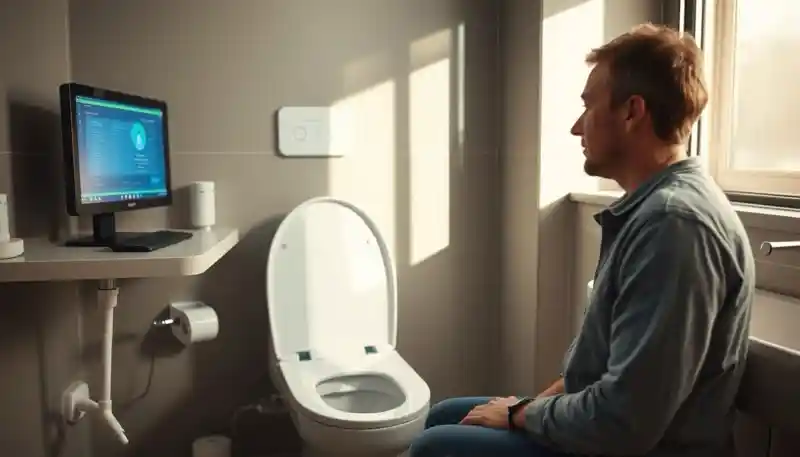Are you worried about catching cancer too late? A new “smart toilet” might ease your mind. This high-tech bathroom fixture can spot signs of cancer up to five years before symptoms show.
You’ll learn how this toilet works and why it’s a game-changer for health. Get ready to see your bathroom in a whole new light.
Key Takeaways
- Smart toilets use AI and sensors to analyze waste, detecting signs of cancer up to five years before symptoms appear.
- These high-tech toilets can identify different stool types with 85% accuracy and spot blood in stool 76% of the time.
- The devices can detect early signs of various health issues, including kidney problems, bladder cancer, urinary tract infections, and diabetes.
- Smart toilets enhance preventive health strategies by providing daily health monitoring and early warning of potential problems.
- This technology allows for timely treatment and improved health management, with doctors receiving alerts about any abnormalities detected.
How the Smart Toilet Works

The Smart Toilet uses sensors to check your waste. It then sends this data to a computer system that looks for signs of health issues.
Utilizes AI and sensors for waste analysis
Smart toilets use cutting-edge tech to check your health. These high-tech loos have sensors that analyze your waste. They look at urine with special test strips and cameras. For stool, they use pressure sensors and video recordings.
A smart computer system then studies the images to spot health issues.
Types of Diseases Detectable by the Smart Toilet
The smart toilet can spot early signs of cancer and other health issues. Want to know more about this amazing tech? Keep reading!
Early signs of cancer and chronic illnesses
Smart toilets can spot early signs of cancer and other health issues. These high-tech devices analyze your waste to find markers of disease. They look for things like blood in urine, which could point to kidney problems or bladder cancer.
The toilets also check stool consistency, which may reveal colon issues.
Your smart toilet acts like a personal health monitor. It can detect urinary tract infections, diabetes, and even some cancers up to five years early. This early warning system gives you a big head start on treatment.
Next, let’s explore how these amazing toilets actually work to protect your health.
Impact and Benefits of Early Disease Detection
Early disease detection can save lives. Smart toilets help catch health issues before they become serious problems.
Enhances preventive health strategies
Smart toilets boost your health care in a big way. They keep track of your health every day, spotting problems before they get worse. This helps you and your doctor make better choices about your well-being.
You’ll get a heads-up on issues that might have gone unnoticed.
These high-tech toilets use artificial intelligence to check your waste. They look for signs of cancer and other illnesses up to five years early. This gives you a huge advantage in fighting disease.
With this info, you can take action sooner and improve your chances of staying healthy longer.
FAQs
1. What is a smart toilet and how does it detect cancer early?
A smart toilet is an internet-connected device that performs urine analysis and chemical tests. It uses computer vision and a cloud-based system to detect signs of cancer up to five years before standard methods.
2. How does the smart toilet protect user privacy and data?
The smart toilet follows the Health Insurance Portability and Accountability Act for data protection. It uses cybersecurity measures to safeguard health information and medical records from unauthorized access.
3. Can the smart toilet diagnose other health issues besides cancer?
Yes, the smart toilet can identify various ailments through urinalyses. It can detect signs of kidney failure, irritable bowel syndrome, and benign prostatic hyperplasia.
4. How does the smart toilet compare to other health monitoring devices?
Unlike wearable devices like Fitbits or fitness trackers, the smart toilet offers continuous health monitoring without user effort. It provides more comprehensive health feedback than urinary test strips or dipstick tests.
5. Who developed the smart toilet technology?
The smart toilet was developed by coinventors at Stanford University, including Sanjiv “Sam” Gambhir from the Molecular Imaging Program. Their work was published in Nature Biomedical Engineering.
6. Are there concerns about using smart toilets for health monitoring?
Some people worry about privacy and surveillance issues with smart toilets. There are also concerns about the impact on mental health from constant health monitoring and the “quantified self” trend.
References
- https://today.duke.edu/2021/05/smart-toilet-uses-artificial-intelligence-monitor-bowel-health (2021-05-24)
- https://med.stanford.edu/news/all-news/2020/04/smart-toilet-monitors-for-signs-of-disease.html
- https://www.usatoday.com/story/tech/2019/12/18/smart-toilet-technology-could-check-urine-detect-diseases-early/4408106002/ (2019-12-18)
- https://www.ncbi.nlm.nih.gov/pmc/articles/PMC10724815/





